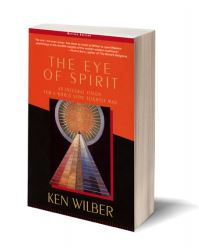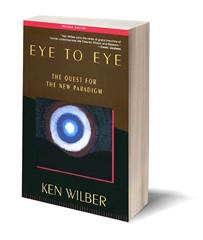|
TRANSLATE THIS ARTICLE
Integral World: Exploring Theories of Everything
An independent forum for a critical discussion of the integral philosophy of Ken Wilber
 Brad Reynolds did graduate work at the California Institute of Integral Studies (CIIS) before leaving to study under Ken Wilber for a decade, and published two books reviewing Wilber's work: Embracing Reality: The Integral Vision of Ken Wilber (Tarcher, 2004), Where's Wilber At?: Ken Wilber's Integral Vision in the New Millennium (Paragon House, 2006) and God's Great Tradition of Global Wisdom: Guru Yoga-Satsang in the Integral Age (Bright Alliance, 2021). Visit: http://integralartandstudies.com Brad Reynolds did graduate work at the California Institute of Integral Studies (CIIS) before leaving to study under Ken Wilber for a decade, and published two books reviewing Wilber's work: Embracing Reality: The Integral Vision of Ken Wilber (Tarcher, 2004), Where's Wilber At?: Ken Wilber's Integral Vision in the New Millennium (Paragon House, 2006) and God's Great Tradition of Global Wisdom: Guru Yoga-Satsang in the Integral Age (Bright Alliance, 2021). Visit: http://integralartandstudies.com
Partially True,
|
|||||||||||||||||||||||||

|
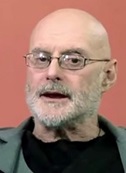
|
| Frank Visser | Ken Wilber |
Rather, Visser relies only on empirical science (using only the Eyes of Nature and Mind) to explain the vastness of an interior-exterior based Kosmos, thus missing dimensions science cannot measure or explain. This, however, is a “category error,” a perpetual fallacy (also made by reductionistic science) that Integral Theory counters and corrects.[2] Transcendental Spirit, or Real God, is in fact real and true; a person just needs to be adequately trained to access this important mode of knowledge acquisition—i.e., by opening (and using) the Eye of Spirit—and this means more than just meditating (for it involves whole body practices and sincere commitments). But science has no clue (or very little), because God is not an object to be measured or quantified. Nevertheless, your very own consciousness can know or realize that Divine Truth—indeed, this is what the entire transpersonal and yogic enterprises, practiced for thousands of years, is all about.
Hence, with Visser posting counter arguments to Wilber's Integral Vision on a web site claiming to promote an “Integral World” without taking a spiritual perspective into account (in fact, ridiculing it) actually creates a terrible distortion, even though he is correct on some counts. It's one thing to critique critical errors, which needs to be done, but another to call into question the integrity of Wilber's overall integral agenda. To deny Spirit and spirituality altogether is simply not integral. Hence, it is my responsibility, and those of other integral thinkers, to counter the limitations and partiality expressed in Visser's views. This does not mean, let me be clear, that we must accept everything Wilber says, but rather, I am claiming Wilber's integral philosophy, and his inclusion of Spirit into a working model of reality, is much more accurate, and less partial, than Visser's view. Integral transcends-and-includes science, not denies it, in a larger (and deeper) understanding of reality.
From what I see, Visser has three basic critiques he aims at Wilber and his theories:
- Visser critiques Wilber's understanding and presentation of biological evolution (and even science in general), especially in his lack of appreciation for and articulation of the explanatory power of natural selection and random mutations to initiate evolutionary change, as advanced and explained by today's evolutionary sciences. Nonetheless, I believe Wilber has a greater appreciation of natural selection than many of his comments (especially in video interviews) seem to indicate, yet Visser is partially correct to point out this apparent fallacy or oversight.
- Visser is especially critical of Wilber's tendency to dismiss science's explanation of biological evolution towards complexity by inserting a “force,” such as “Eros” (or “Spirit-in-action”). I agree, at times, this seems like a “Creationist's slip” or a mistake made by Wilber similar to mundane “design arguments” for the existence of God (used by Creationists). Yet, if one focuses on other passages and statements made by Wilber in his writings (which I will highlight), Visser's approach creates a distortion and false reading of the Integral Vision. Nonetheless, Visser is correct to point out these misstatements, especially since Wilber keeps committing them. In other words, in my opinion, it is Wilber's version of a category error (which I hope to clarify and correct in future essays).
- Importantly, Visser harshly criticizes Wilber's attitude to not engage in addressing and answering his critics, instead of just dismissing them with a wave of the hand and a conceited smirk (particularly in his video interviews), or to simply call them names (such as “flatland reductionists”). As Visser complains: “[Wilber] hides behind a smoke screen of grandiose metaphysical knowledge claims, repetitive arguments, and angry tirades.”[3] To some degree this seems true to me as well, though I believe Visser exaggerates (since he's grown impatient with Wilber's attitude to criticism). Yet, I maintain, he is incorrect by not reading Wilber's “metaphysical” (actually spiritual) statements correctly and accurately (but that's Wilber's fault too, especially since he has provided too much ammunition for Visser to use with his certain inaccuracies and fallacies).
Hence, I tend to agree that Wilber should take these critiques more seriously, for Visser states them well and systematically, therefore, they need to be adequately addressed by either Wilber or other integral thinkers (which I hope to do, to some degree). Mostly, my contention will be that Wilber himself has made a category error when he tries to insert Eros-Spirit into the evolutionary equation as an explanatory “force” instead of emphasizing that the entire evolutionary process, on ALL levels (physiosphere, biosphere, noosphere, theosphere, et al) is Spirit-in-action as a whole. In other words, God is not “running” evolution by acting upon it (as if “God” is an outside actor), but rather evolution itself is God-in-action (as immanent Spirit) creating the universe and all beings (and life) within it. God, in other words, includes random “chance.” We do not need to use science to prove God, an impossibility (a category error), by finding “holes” or “gaps” in evolution or any other clever theories supporting plausibility arguments. In another context, addressing the use of quantum physics as a proof for God, Wilber once said: “The attempt to 'prove' mysticism with modern physics [or biological evolution] is not only wrong but actually detrimental to genuine mysticism.”[4] God is discovered with the Eye of Spirit (via satori), not with science or the arguments of the mind (or measuring with the eyes of the body and its extensions). Once seen (or realized), however, God is evident to the mind and to the awakened eyes as Beauty, Truth, and Love (or Eros). This will be the thesis I shall emphasize in considering the real Integral Vision.
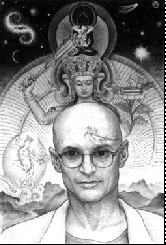
Unfortunately, however, Wilber has declined to engage in clarifying and correcting Visser's critiques, or to show us a more sophisticated understanding of what science does claim about the tenets of biological evolution by natural selection and random genetic modification—or “descent with modification,” as Darwin defined it. Yes, I agree, at times it seems Wilber makes what I call “Creationist slips,” or plausibility arguments in trying to defend the necessity for a “Designer” (or God or Spirit), or, as Visser likes to hammer home, often called “Eros.” However, if you understand Wilber's overall context, and review other, better quotes (that I will emphasize), you will see this is not his intent. Nonetheless, Visser is correct to point out these category fallacies in some of Wilber's work, especially in those (not recommended) video interviews.
Therefore, this stance of refusing (instead of refuting) his critics might have put Wilber's reputation in danger of being suspect, and worse, dismissed as being just another personal philosophy from a closeted philosopher sitting on a meditation cushion secluded in his “ivory” tower (or, in this case, on the mountaintops of Colorado). Ironically, Wilber's philosophy has been largely absent in the halls of academia, with several important exceptions, since it requires spiritual practice (sadhana and meditation) in order to access all the modes of knowledge acquisition embraced by the Integral Vision. In other words, Wilber's approach to philosophy is too difficult to include its entire curriculum in modern schools of education.[5] This, obviously, makes the situation doubly difficult.
Partially True, Partially False: An On-Going Debate

A gain, I maintain Visser's views are not only partially true, but mostly untrue when taken altogether, since he constantly misses the fundamental purpose of Wilber's overall Integral Vision. By denying the fact that Spirit or a Divine Reality is behind (or transcendent) and integral (or immanent) within the entire evolutionary process as a whole, proves Visser is not truly integral (though very smart and sincere). Although he has done a good service in pointing out some errors and inconsistences in Wilber's statements on biological evolution, overall, he performs a greater disservice in not understanding (or presenting) what spiritual evolution is about, or what its holistic purpose is: recognition of the inherent Divine Nature of the Kosmos so evolution itself can be transcended in God-Realization (and, then, after death). As Ken Wilber once noted in A Brief History of Everything (1996):
Evolution occurs in the world of time and space and form, whereas Spirit's primordial nature is finally timeless and Formless, prior to the world of evolution but not other to it. We do not find Spirit or Emptiness by reaching some evolutionary Omega point in time, but rather by stepping off the cycle of time and evolution altogether (or ceasing to contract into it).[6]

Visser's preferred philosophy is science, a reductionistic scientific materialism, leading to scientism, or the belief that only science has the answers. Currently, some people call it “Dawkins' doctrine” (after Richard Dawkins), which Visser seems to subscribe to. Yet, beginning at least with Kant's critiques (at the end of the 18th century), science can only measure observable phenomena (not noumena or the “thing-in-itself”), a position which is amplified by Wilber and others (in the early 21st century). Wilber summarized Kant's position in The Marriage of Sense and Soul (1998): “Pure reason [is] incapable of grasping, let alone proving, metaphysical or transcendental realities (such as God, freedom, the timelessness of the soul)…. We might say that scientific reasoning (it-rationality) cannot grasp God because God is not an empirical object.”[7] This means, basically, it is not true that science is the end-all of knowledge and wisdom; a contributor, yes, but the final say, no. As the Spiritual Teacher Adi Da has often said: “Science is a method, not a philosophy.”[8] This is contained in the essence of the Integral Vision.
Most important, therefore, it's critical to understand that Integral Theory fully embraces the facts and knowledge of science (gained with the Eyes of Flesh and Mind), as Wilber fully admits, yet goes beyond it by including knowledge gained from spiritual practice and transpersonal insight as well, a factor Visser fails to acknowledge and integrate. In other words, natural selection is true but partial; quantum mechanics and general relativity are correct but partial; psychology and philosophy are true but partial; even yogic mysticism is true but partial, and so forth. Only Enlightenment, and our (and our universe's) final dissolution (or “translation”) into the Brightness of Real God, has the final say, so to speak, yet this cannot be proven by thought or equations, but only realized in the heart (as our highest evolutionary potential).
Science and spirituality are “married” or united by each contributing to the overall Integral Vision, thus providing us with a genuine “Theory of Everything,” ranging from the physical to the mental-psychic to the mystic-spiritual, including all possibilities of knowledge and wisdom. Such an integral understanding is beneficial to everyone, especially in our emerging global culture where divisions, diversity, and disagreements must be transcended in higher truths and wider perspectives embracing all of Reality. In this case, while correct on a partial list of issues, yet limited ones at that, Visser has done damage by distorting Wilber's views, creating what I have called a “strawman,” in order to champion his own personal philosophy where only science understands what is “true” and how we should orient our integral maps.[9] In actuality (in reality), there is room for both science and spirituality (even etheric-magic, myths, and mysticism) in understanding ourselves, other living beings, and our universe.
Science, according to Visser and others, such as Richard Dawkins (author of The Selfish Gene) and Daniel Dennett (author of Darwin's Dangerous Idea), believes it has proven there is no purpose to existence and life, to human evolution, other than environmental adaptation and survival (whether through cooperation or competition). To suggest otherwise, according to this view, are only projections of human mentality that itself was created by blind chance and fortunate circumstances. But this is only a philosophy, a belief system (called scientism), not the actual facts uncovered by biology, for they only address observations of how evolution works, not why it occurs, since all truths do not originate from the same domains of existence.
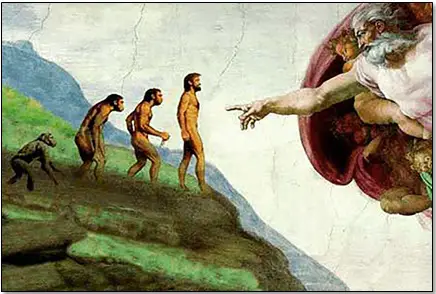
This is the limitation of seeing evolution active only in biology (in the biosphere or Right-Hand quadrants only), thus missing the “Big Picture” (or “Big History”) of evolution as a cosmic and spiritual process. Yet, truly, evolution is only the process of becoming, therefore, if we focus too much on evolution alone, we will miss the Presence of Being itself, which is Spirit (or God) always already Present right here and now. We don't have to evolve anywhere, nor worry about our primordial past, to presently enjoy the Presence of Spirit (and Eros-Love) actively creating (and living) our world as we speak.
In this case, according to the Integral Vision, I will constantly maintain, ALL methods and “Eyes of Knowing” or knowledge acquisition must be used to “see” and understand the whole of Reality, including spiritual visions, as well as using sober reason (even “magical” intuitions and mythic archetypes, etc.). Over this coming year of 2020, one of seeing more clearly, I hope to contribute a series of essays elucidating and expanding upon these topics to try and bring some peace to the “mini-battle” between Ken Wilber's and Frank Visser's perspectives by claiming each is partially true, each partially false, yet the real Integral Vision is more true than either.


| BRAD'S WRITINGS | ||
|---|---|---|
| Brad's selected IntegralWorld essays | ||
|
|
||
| BRAD'S BOOKS | ||
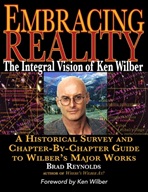
|
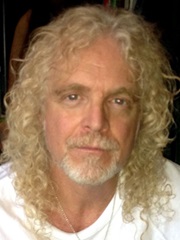
|
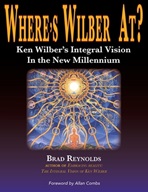
|
|
www.integralartandstudies.com |
||
NOTES
[1] See: Brad Reynolds, “Real Integral vs. Fake Integral: Transcending-Yet-Including the Knowledge of Science, Parts 1-3,” 2019, on IntegralWorld.net.
[2] See: Ken Wilber, Eye to Eye (1983, 1990, 2001); The Eye of Spirit (1997, 2001).
[3] See: Frank Visser, “It is Part of this Miracle of Emergence: Ken Wilber Argues for his Mysterianism” (January 2020, IntegralWorld.net)
[4] Ken Wilber, Quantum Questions (1984), p. 27n.
[5] See, for example: Education in a Time Between Worlds: Essays on the Future of Schools, Technology, and Society (2018) by Zachary Stein.
[6] Ken Wilber, A Brief History of Everything (1996), pp. 279-280 [italics added].
[7] Ken Wilber, The Marriage of Sense and Soul (1998), p. 86.
[8] See: Avatar Adi Da Samraj, Science Is a Method, Not a Philosophy CD (2010); also see: Scientific Proof of the Existence of God Will Soon Be Announced by the White House (1980), with a foreword by Ken Wilber.
[9] See: Brad Reynolds, “Real Integral vs. Fake Integral: Transcending-Yet-Including the Knowledge of Science, Parts 1-3”; also, see: Frank Visser, “Strawman or Steelman? The Wilberian Evolution Controversy.”
